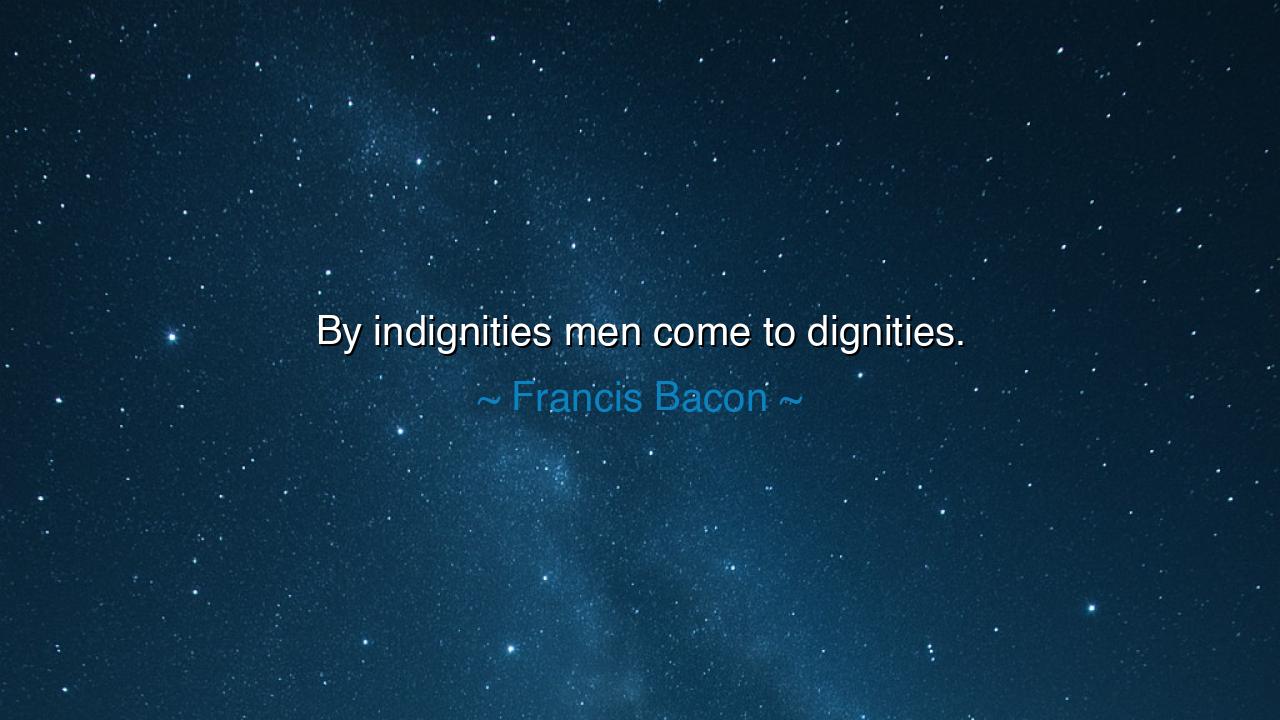
By indignities men come to dignities.






Hear and mark well the wisdom of Francis Bacon, who, gazing into the patterns of human struggle, declared: “By indignities men come to dignities.” At first, these words strike the heart like a paradox. How can it be that shame leads to honor, or that humiliation becomes the threshold of greatness? Yet the ancients knew this truth well—that no crown is set upon the head without first passing through trials, and no man rises to glory without first being bowed low in suffering.
The word indignities speaks of hardship, mockery, scorn, and the thousand wounds inflicted by life upon the soul. To endure them is bitter, for they strip away pride and cast man into the dust. Yet in this stripping lies the seed of strength. For he who has been tested in fire emerges hardened; he who has drunk of sorrow learns compassion; he who has been humbled gains the wisdom to rule with justice. Thus, Bacon’s saying reveals that the path to dignities, to honor and authority, is not smooth marble but rough stone, carved by pain.
Consider the story of Joseph, son of Jacob, from the ancient scriptures. Betrayed by his brothers, sold into slavery, cast into prison by false accusation—these were his indignities. Yet from those depths, by faith and steadfastness, he rose to become the steward of Egypt, saving nations from famine. Had he not endured humiliation, he could not have borne the burden of dignity. His tale is but one mirror of Bacon’s truth: that greatness is born in the crucible of disgrace.
History too testifies in the lives of mortals less sanctified. Recall Abraham Lincoln, mocked as unrefined, defeated in election after election, despised by many as unworthy. Yet these indignities were his tutors, sharpening his resolve and tempering his humility. In time, he rose to the dignity of the presidency, guiding a nation through its darkest night. The sneers of others became the foundation of his endurance, and his trials became the soil from which his nobility grew.
Thus, let no man despise the hour of shame or rejection. The indignities that sting today may be the very furnace that prepares the soul for tomorrow’s honor. The mockery of men is fleeting, but the dignity that comes from overcoming hardship is eternal. The world crowns not those who never fell, but those who fell and rose again, bearing the scars as emblems of victory.
Take this teaching, then, into the marrow of your being: when life presses you down, when insult or failure burn your spirit, remember Bacon’s wisdom. Do not flee from hardship, nor curse the day of humiliation. Instead, endure with courage, learn with patience, and rise with strength. For every dignity worth having is purchased with struggle, and every throne of honor is built upon the ashes of pain endured.
Practical is this counsel: when you are scorned, answer not with bitterness but with silence and perseverance. When you are wronged, let it refine your resolve, not poison your spirit. Seek not revenge, but mastery of yourself. Record your failures as teachers, your humiliations as stepping stones, and your hardships as hidden gifts. In this way, you will transform indignities into the very ladder by which you ascend to dignities.
So let it be remembered: by indignities men come to dignities. This is the eternal rhythm of the human story—that suffering precedes glory, and that the deepest valleys lead to the highest mountains. Embrace this law, O seeker, and you shall walk the path of heroes, bearing every insult as the hidden herald of your coming honor.






AAdministratorAdministrator
Welcome, honored guests. Please leave a comment, we will respond soon